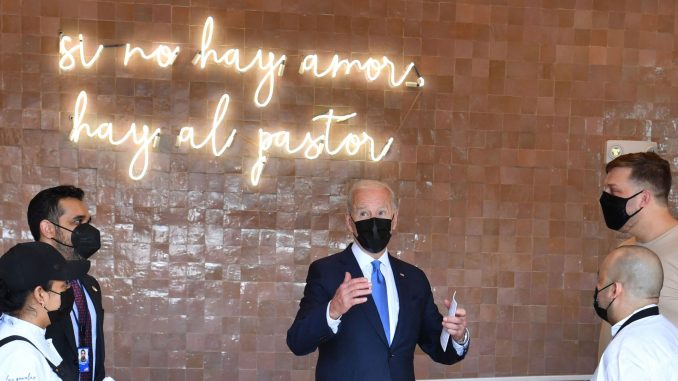
Government programs that give preferences to businesses owned by racial and ethnic minorities are popular tools among liberal politicians and bureaucrats.
Their proponents defend them as necessary to advance “racial equity” and “social justice,” though they are morally wrong.
But there’s another reason to reject these programs: They have the unintended side effects of discouraging people from going into business with people of another race and of discriminating against people in interracial marriages.
Typically, these programs operate by giving special benefits to businesses that are “owned and controlled” by minorities. What that means, specifically, is that one or more minority individuals owns at least 51% of the business.
Sometimes, these programs give those businesses an advantage at securing contracts, and other times, they give them preferences on getting financial handouts.
The latter was the case with President Joe Biden’s Restaurant Revitalization Fund.
The Restaurant Revitalization Fund was a limited pool of federal money meant to help restaurants struggling during the COVID-19 pandemic. As with any finite resource, only people who got to the front of the line could be sure to get some before it ran out.
Knowing that, the Biden administration reserved the first 21 days of the application period for businesses owned and controlled by women, veterans, and racial minorities.
The program was meant to help only small restaurants, not large chains. Many applicants were typical “mom-and-pop shops” (restaurants jointly owned by a husband and wife), or small partnerships among a few people.
In those types of restaurants, it’s common that no one person owns 51% or more of the business. A husband and wife, for example, would typically own their business equally.
That means that if one spouse is a racial minority and the other is white, the business wouldn’t qualify for the program.
That happened to Antonio Vitolo and his wife, owners of Jake’s Bar and Grill in Harriman, Tenn. She is Hispanic, and therefore qualifies as a minority under the program, but he is white. Because they own their restaurant jointly, it was 1 percentage point shy of being “owned and controlled” by a racial minority.
As a result, the Biden administration sent the Vitolos to the back of the line.
The irony here is that the restaurant would have been approved if Mrs. Vitolo hadn’t married outside of her racial group, which calls to mind some of the worst rhetoric of some of America’s worst people. Better people agree that the government should not punish people for interracial marriage, and yet the government does just that.
The same goes for small-business partnerships between people of different racial groups. A business jointly owned by a black person and a white one would also not qualify under the program, which creates an incentive for minorities to stick to their own race—or at least to avoid partnerships with white people. That, too, calls to mind some problematic rhetoric.
A court struck down the racial-preference component of the Restaurant Revitalization Fund, but there are hundreds of other such programs at the federal, state, and local level. And the Biden administration is hard at work to create more.
Whatever else can be said against these programs—and much can—at the very least, the government ought not to administer them in a way that encourages separation and punishes interracial marriages.
Ideally, the government would not administer racially preferential policies of any sort. They draw arbitrary lines between equal citizens and make it difficult, if not impossible, to unite a multicultural nation around higher principles. But at least for now, many such programs remain on the books.
What’s more, liberals tend to favor racial preferences, and so will fight to preserve them. We conservatives hope to win that broader fight. But for now, perhaps at least in this one area, we can find common ground: Congress and state legislatures should redefine “owned and controlled” to be 50% instead of 51%.
That won’t end our debate about racial preferences. It doesn’t fix the fundamental problem with these programs. But that small change will ensure that, as long as we still have them, they won’t punish interracial partners and couples.
Have an opinion about this article? To sound off, please email letters@DailySignal.com and we’ll consider publishing your edited remarks in our regular “We Hear You” feature. Remember to include the url or headline of the article plus your name and town and/or state.

